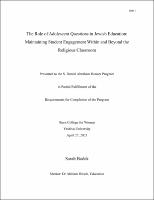Please use this identifier to cite or link to this item:
https://hdl.handle.net/20.500.12202/6858Full metadata record
| DC Field | Value | Language |
|---|---|---|
| dc.contributor.advisor | Hirsch, Miriam | - |
| dc.contributor.author | Bodek, Sarah | - |
| dc.date.accessioned | 2021-06-10T18:58:29Z | - |
| dc.date.available | 2021-06-10T18:58:29Z | - |
| dc.date.issued | 2021-04-27 | - |
| dc.identifier.citation | Bodek, S. (2021, April 27). The Role of Adolescent Questions in Jewish Education: Maintaining Student Engagement Within and Beyond the Religious Classroom [Bachelor's honors thesis, Yeshiva University]. | en_US |
| dc.identifier.uri | https://hdl.handle.net/20.500.12202/6858 | - |
| dc.description | Senior honors thesis / Open Access | en_US |
| dc.description.abstract | As the research has proven, promoting, addressing and grappling with students’ questions is not merely required by teachers, but highly beneficial for them to do so. In truth, the personal scenario I described earlier, provided my teacher with a prime opportunity to engage my interests in the realm of Jewish law and to inculcate a love of learning within me. Instead, I was dismissed and not given proper attention; essentially ignored and deemed problematic. Based upon the literary review above, this paper has demonstrated the psychology of adolescence, relationships in the classroom, the Jewish view on educational practices and inquiry and subsequent recommendations for teachers to navigate inquiry in the classroom. The recommendations provided are intended to better the actions of Jewish educators that encounter a challenging question in the classroom and could have helped my 6th-grade teacher navigate my question. Indeed, the issue of a grape versus a lemon could have been a stepping stone to a broader discussion on the authority of the rabbis. I was willing to have it, and eager to do so, in order to deepen my grasp of my Tradition. Unfortunately, I was not afforded this “luxury”. If only my teacher understood that questioning wasn’t merely a necessary evil to avoid. Rather, it could have been used as an essential tool to ensure my deepest learning, understanding and interest in my heritage. Particularly in the realm of Judaism, questions are lauded as an essential tool to plunge the depths of traditional sources. Seemingly threatening, inquiry can bring one closer to Judaism, as opposed to distancing them from it. As Dr. Deena Rabinovich states, “Ask your questions, the Torah can handle it!” (Rabinovich, 2020). Jewish tradition has withstood generations of persecution and can similarly handle students' questions on it. That is exactly the way it is meant to be studied and understood. (from Conclusion) | en_US |
| dc.description.sponsorship | The S. Daniel Abraham Honors Program | en_US |
| dc.language.iso | en_US | en_US |
| dc.rights | Attribution-NonCommercial-NoDerivs 3.0 United States | * |
| dc.rights.uri | http://creativecommons.org/licenses/by-nc-nd/3.0/us/ | * |
| dc.subject | student engagement | en_US |
| dc.subject | adolescent questions | en_US |
| dc.subject | Jewish education | en_US |
| dc.subject | religious classroom | en_US |
| dc.title | The Role of Adolescent Questions in Jewish Education: Maintaining Student Engagement Within and Beyond the Religious Classroom | en_US |
| dc.type | Thesis | en_US |
| Appears in Collections: | S. Daniel Abraham Honors Student Theses | |
Files in This Item:
| File | Description | Size | Format | |
|---|---|---|---|---|
| Bodek Sarah The Role of Adolescent OA 27April2021.pdf | 195.46 kB | Adobe PDF |  View/Open |
This item is licensed under a Creative Commons License

